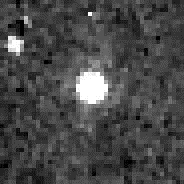astro.wikisort.org - Asteroid
(145452) 2005 RN43, also written as (145452) 2005 RN43, is a classical Kuiper belt object. It has an estimated diameter of 679+55
−73 km.[6] It was discovered by Andrew Becker, Andrew Puckett and Jeremy Kubica on 10 September 2005 at Apache Point Observatory in Sunspot, New Mexico. Brown estimates that it is possibly a dwarf planet.[9][10]
 Hubble Space Telescope image of 2005 RN43, taken on April 2010 | |
| Discovery[1] | |
|---|---|
| Discovered by | A. C. Becker A. W. Puckett J. M. Kubica |
| Discovery site | APO |
| Discovery date | 10 September 2005 |
| Designations | |
MPC designation | (145452) 2005 RN43 |
Minor planet category | TNO Cubewano[2][3] Extended (DES)[4] |
| Orbital characteristics[2] | |
| Epoch 13 January 2016 (JD 2457400.5) | |
| Uncertainty parameter 3 | |
| Observation arc | 22376 days (61.26 yr) |
| Earliest precovery date | 2 June 1954 |
| Aphelion | 42.146 AU (6.3050 Tm) |
| Perihelion | 40.571 AU (6.0693 Tm) |
Semi-major axis | 41.359 AU (6.1872 Tm) |
| Eccentricity | 0.019047 |
Orbital period (sidereal) | 265.99 yr (97151.5 d) |
Average orbital speed | 0.0037°/d |
Mean anomaly | 338.28° |
Mean motion | 0° 0m 13.34s / day |
| Inclination | 19.313° |
Longitude of ascending node | 186.93° |
Time of perihelion | ≈ 15 June 2029[5] ±9 days |
Argument of perihelion | 174.88° |
| Earth MOID | 39.5672 AU (5.91917 Tm) |
| Jupiter MOID | 35.6155 AU (5.32800 Tm) |
| TJupiter | 5.446 |
| Physical characteristics | |
| Dimensions | 679+55 −73 km[6] |
Synodic rotation period | 6.95 h (0.290 d) |
Sidereal rotation period | 5.62 h[2] |
Geometric albedo | 0.107+0.029 −0.018[6] |
Spectral type | IR–RR (red)[6] B–V=0.95±0.02[7] V–R=0.59±0.01[7] V–I=1.08±0.02[7] |
Apparent magnitude | 20.1[8] |
Absolute magnitude (H) | 3.89±0.05[6] 3.9[2] |
Classification
The Minor Planet Center (MPC) classifies it as a cubewano.[3] But since this object has an inclination of 19.3°, the Deep Ecliptic Survey (DES) classifies it as scattered-extended.[4]
It has been observed 119 times over thirteen oppositions, with precovery images back to 1954.[2]
See also
References
- "List Of Transneptunian Objects". Minor Planet Center. Retrieved 22 August 2016.
- "JPL Small-Body Database Browser: 145452 (2005 RN43)" (2015-08-13 last obs). Retrieved 11 April 2016.
- "MPEC 2009-R09 :Distant Minor Planets (2009 September 16.0 TT)". IAU Minor Planet Center. 2009-09-04. Retrieved 2010-01-08.
- Marc W. Buie. "Orbit Fit and Astrometric record for 145452" (2008-08-09 using 220 of 221 observations). SwRI (Space Science Department). Retrieved 2009-10-04.
- JPL Horizons Observer Location: @sun (Perihelion occurs when deldot changes from negative to positive. Uncertainty in time of perihelion is 3-sigma.)
- Vilenius, E.; Kiss, C.; Mommert, M.; et al. (2012). ""TNOs are Cool": A survey of the trans-Neptunian region VI. Herschel/PACS observations and thermal modeling of 19 classical Kuiper belt objects". Astronomy & Astrophysics. 541: A94. arXiv:1204.0697. Bibcode:2012A&A...541A..94V. doi:10.1051/0004-6361/201118743. S2CID 54222700.
- Belskaya, Irina N.; Barucci, Maria A.; Fulchignoni, Marcello; Lazzarin, M. (April 2015). "Updated taxonomy of trans-neptunian objects and centaurs: Influence of albedo". Icarus. 250: 482–491. Bibcode:2015Icar..250..482B. doi:10.1016/j.icarus.2014.12.004.
- "AstDys (145452) 2005RN43 Ephemerides". Department of Mathematics, University of Pisa, Italy. Retrieved 2009-12-07.
- Michael E. Brown. "How many dwarf planets are there in the outer solar system? (updates daily)". California Institute of Technology. Archived from the original on 2011-10-18. Retrieved 2011-08-25.
- Tancredi, Gonzalo (2009), "Physical and dynamical characteristics of icy "dwarf planets" (plutoids)", Proceedings of the International Astronomical Union, 5: 173–185, Bibcode:2010IAUS..263..173T, doi:10.1017/S1743921310001717
External links
На других языках
[de] (145452) 2005 RN43
(145452) 2005 RN43 ist ein großes transneptunisches Objekt im Kuipergürtel, das als Cubewano (CKBO) oder als erweitertes Scattered Disk Object (DO) eingestuft wird. Aufgrund seiner Größe ist der Asteroid ein Zwergplanetenkandidat.- [en] (145452) 2005 RN43
[ru] (145452) 2005 RN43
2005 RN43 — крупный классический объект пояса Койпера[3].Текст в блоке "Читать" взят с сайта "Википедия" и доступен по лицензии Creative Commons Attribution-ShareAlike; в отдельных случаях могут действовать дополнительные условия.
Другой контент может иметь иную лицензию. Перед использованием материалов сайта WikiSort.org внимательно изучите правила лицензирования конкретных элементов наполнения сайта.
Другой контент может иметь иную лицензию. Перед использованием материалов сайта WikiSort.org внимательно изучите правила лицензирования конкретных элементов наполнения сайта.
2019-2025
WikiSort.org - проект по пересортировке и дополнению контента Википедии
WikiSort.org - проект по пересортировке и дополнению контента Википедии

